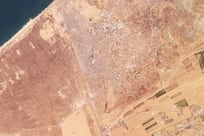With only four days to go before OPEC meets in Vienna to consider further action on production quotas, Saudi Arabia's oil minister predicted crude would climb to US$75 per barrel once demand picked up. Oil prices have almost doubled since December, closing on Friday at $61.55 a barrel. King Abdullah of Saudi Arabia has said $75 is a "fair price" for crude. "We'll get there eventually," Ali al Naimi told reporters in Rome, where he was attending meetings with energy ministers from the Group of Eight industrialised nations. "The trick is keeping it between $70 and $80. It will be achieved as demand rises and the fundamentals are better than they are now." Despite the swollen oil stockpiles still overhanging the market, the influential Saudi minister said he would recommend that OPEC "stay the course" at Thursday's meeting, and leave its output target unchanged at 24.845 million barrels per day (bpd). Mr al Naimi said he was "happy" with the current level of member compliance with the record 4.2 million bpd of cuts OPEC announced last year, estimating it was about 80 per cent and "the best we can expect". Keeping oil prices at about $75 a barrel would be good for the world economy, he said. That is a position the world's big energy consumers seem increasingly unlikely to challenge. "What the world wants - oil-producing countries and oil-consuming countries - is stable oil prices," Steven Chu, the US energy secretary, said yesterday in Rome. "Another spike in oil would have consequences in terms of world recovery, but if the economy doesn't recover, oil demand will remain down." Earlier this month, Christine Lagarde, the French economy minister, said it would be good if crude settled between $70 and $80 because she wanted oil prices to be less volatile and more predictable. Crude has nearly doubled in price since December, when it hit a low of $32.40 per barrel on the New York Mercantile Exchange (NYMEX), after tumbling from $147.20 in July as the financial crisis and worsening economic conditions sapped demand. Global oil demand has continued to fall, according to data from OPEC and the International Energy Agency, among others. Hugo Chavez, the Venezuelan president, said he was happy with crude's rebound. But his oil minister, Rafael Ramirez, remained concerned about the amount of oil in storage worldwide. "The stock levels are too high and that's a bad sign," Mr Ramirez told Reuters. Shokri Ghanem, Libya's top oil official, said the recent price rise appeared to be driven at least partly by market speculation. He concurred with the Saudi minister that crude would "eventually" rise to $75 per barrel, but not soon, due to the continuing demand weakness. Urging a further production cut, Mohammad Ali Khatibi, the Iranian OPEC governor, said higher oil prices were lulling some OPEC members into a false sense of security. "The temporary price improvement maybe has misled some members," he told Reuters yesterday. "Expert findings show that there is an additional need for a production cut. Non-fundamental factors can disappear quickly, like they did last year after the price went to nearly $150 and then fell." But Khaled Boodai, a member of Kuwait's Supreme Petroleum Council, said OPEC was unlikely to cut output this week and might soon consider boosting supply. "OPEC will seriously consider increasing output in the next period to meet an increasing demand for oil," al Seyassah daily newspaper quoted him as saying. Arab Gulf oil producers, including Saudi Arabia, the UAE and Kuwait, have been the most compliant with OPEC's current production quotas, while Iran has consistently pumped oil above its quota in recent months. That has led analysts to predict that Saudi Arabia and its Arab neighbours would resist a further formal reduction to OPEC's output target, and would instead try to bring the group's overproducers into line. Mr al Naimi said Saudi Arabia's recent crude output of about 8 million bpd was a third lower than its current capacity of 12 million bpd, which was set to rise to 12.5 million bpd by the end of next month with new fields coming on stream. The kingdom, which is the world's biggest oil exporter, "very recently" started producing 100,000 bpd of oil from its Nuayyim oilfield, he said, even though world markets do not currently need the product. tcarlisle@thenational.ae
Crude to climb to $75
Saudi Arabia's oil minister predicted crude would climb to $75 per barrel once demand picked up.
Editor's picks
More from the national




